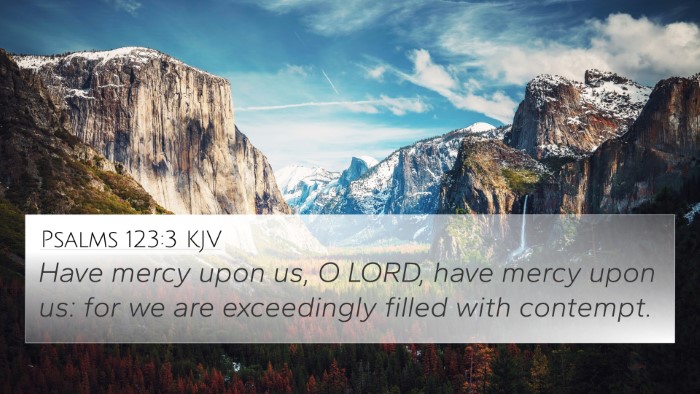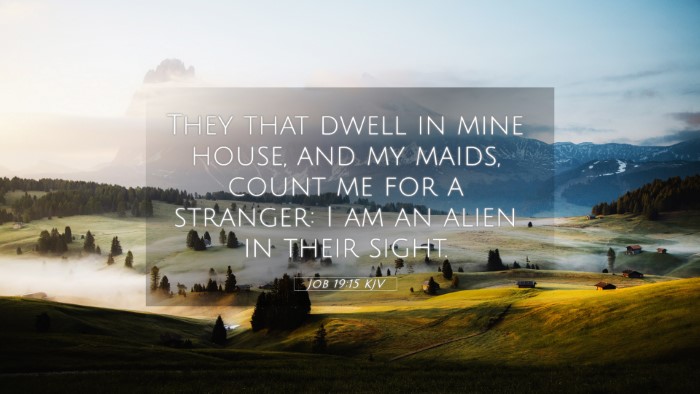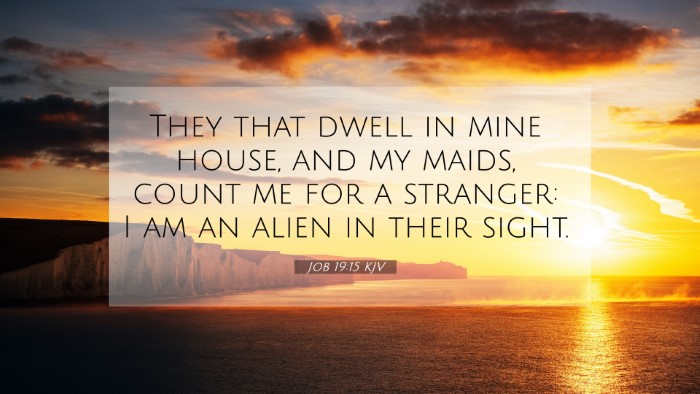Old Testament
Genesis Exodus Leviticus Numbers Deuteronomy Joshua Judges Ruth 1 Samuel 2 Samuel 1 Kings 2 Kings 1 Chronicles 2 Chronicles Ezra Nehemiah Esther Job Psalms Proverbs Ecclesiastes Song of Solomon Isaiah Jeremiah Lamentations Ezekiel Daniel Hosea Joel Amos Obadiah Jonah Micah Nahum Habakkuk Zephaniah Haggai Zechariah MalachiJob 19:15 Similar Verses
Job 19:15 Cross References
They that dwell in mine house, and my maids, count me for a stranger: I am an alien in their sight.
Uncover the Rich Themes and Topics of This Bible Verse
Listed below are the Bible themes associated with Job 19:15. We invite you to explore each theme to gain deeper insights into the Scriptures.
Job 19:15 Cross Reference Verses
This section features a detailed cross-reference designed to enrich your understanding of the Scriptures. Below, you will find carefully selected verses that echo the themes and teachings related to Job 19:15 KJV. Click on any image to explore detailed analyses of related Bible verses and uncover deeper theological insights.

Job 31:31 (KJV) »
If the men of my tabernacle said not, Oh that we had of his flesh! we cannot be satisfied.

Psalms 123:3 (KJV) »
Have mercy upon us, O LORD, have mercy upon us: for we are exceedingly filled with contempt.
Job 19:15 Verse Analysis and Similar Verses
Understanding Job 19:15
Job 19:15 states, "Those who dwell in my house and my maids consider me a stranger; I am an alien in their sight." This verse reflects Job's profound sense of isolation and abandonment in the midst of his suffering. He feels disconnected even from those who are closest to him, illustrating the extent of his despair.
Contextual Overview
To fully grasp the implications of this verse, it is vital to consider the surrounding chapters in the Book of Job. Job, a man of great integrity, suddenly finds himself besieged by calamities, losing his wealth, health, and family. His friends, who initially came to console him, end up questioning his character and faithfulness to God.
Insights from Public Domain Commentaries
- Matthew Henry: This commentary emphasizes Job's overwhelming feeling of estrangement. He notes that even his household members—who should be his supporters—regard him as an outsider due to the afflictions he is enduring. Henry interprets this as a commentary on the nature of suffering, suggesting that when calamity strikes, even close relationships can become strained.
- Albert Barnes: Barnes highlights the emotional turmoil Job experiences as he feels cut off from those he once cherished. He suggests that this reflects a common distress that accompanies deep suffering, where one's social isolation becomes palpable. This allows readers to understand how suffering can affect interpersonal relationships and perceptions.
- Adam Clarke: Clarke provides a theological insight into Job's experience, framing it as a moment of testing that even the most devout believers can face. He argues that Job's assertions reveal the challenges of faith amid trials, prompting believers to reflect on their own faithfulness in times of adversity.
Connections to Other Bible Verses
Job 19:15 can be cross-referenced with several other scriptures that explore themes of isolation, suffering, and the nature of human relationships under duress. Here are some relevant verses:
- Psalms 38:11: "My friends and companions avoid me because of my wounds; my neighbors stay far away." This verse aligns with Job’s feelings of abandonment.
- Psalms 102:6-7: "I am like a desert owl, like an owl among the ruins. I lie awake; I have become like a bird alone on a roof." This captures the loneliness Job feels.
- Hebrews 13:5: "I will never leave you nor forsake you." This serves as a reminder of God’s enduring presence in our isolation.
- Matthew 26:56: "Then all the disciples deserted him and fled." This instance of abandonment highlights the universal experience of feeling deserted, even by those closest to us.
- 1 Peter 5:10: "And after you have suffered a little while, the God of all grace, who has called you to his eternal glory in Christ, will himself restore, confirm, strengthen, and establish you." A promise of hope amid suffering.
- Isaiah 53:3: "He was despised and rejected by men, a man of sorrows, and acquainted with grief." Foreshadowing Christ's own suffering, which connects to Job's plight.
- Ecclesiastes 4:10: "If either of them falls down, one can help the other up. But pity anyone who falls and has no one to help them." This verse reflects the importance of companionship during tough times, contrasting Job's isolation.
Thematic Analysis
This verse also opens up discussions on several overarching themes present in the Bible:
- Suffering and Isolation: Job's feelings of alienation resonate throughout scripture, illustrating humanity's struggle under the weight of grief and loss.
- Faithfulness in Trials: Job remains steadfast in his faith, which prompts readers to consider their responses to adversity.
- Community and Support: The absence of companionship in suffering is a stark reminder of the need for community in difficult times.
Tools for Cross-Referencing
For those looking to delve deeper into the connections between Bible verses, consider using the following resources:
- Bible Concordance: This tool helps locate verses by keywords, facilitating the discovery of thematic connections.
- Bible Cross-Reference Guide: Guides like this can direct readers to relevant verses that align with specific themes.
- Bible Chain References: These resources link verses thematically, helping to see the broader scriptural narrative.
Conclusion
In summary, Job 19:15 exemplifies a moment of profound despair and isolation. Through communal insights from commentaries and cross-referencing with other verses, believers can glean a richer understanding of the complexities of suffering. This verse, like many others, invites reflection on the human condition and our relationship with God and each other during times of trial.


